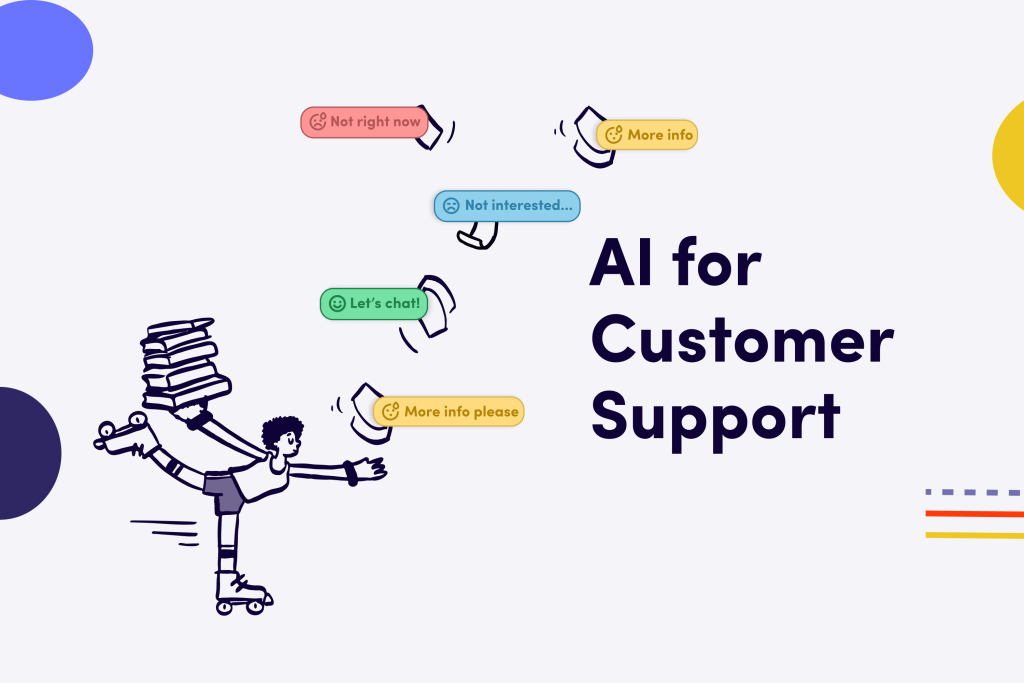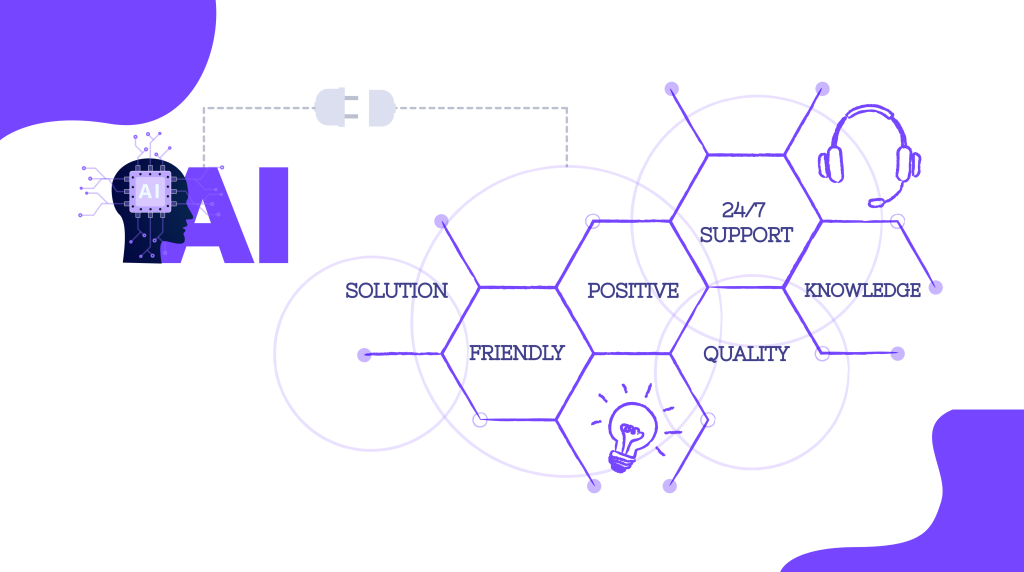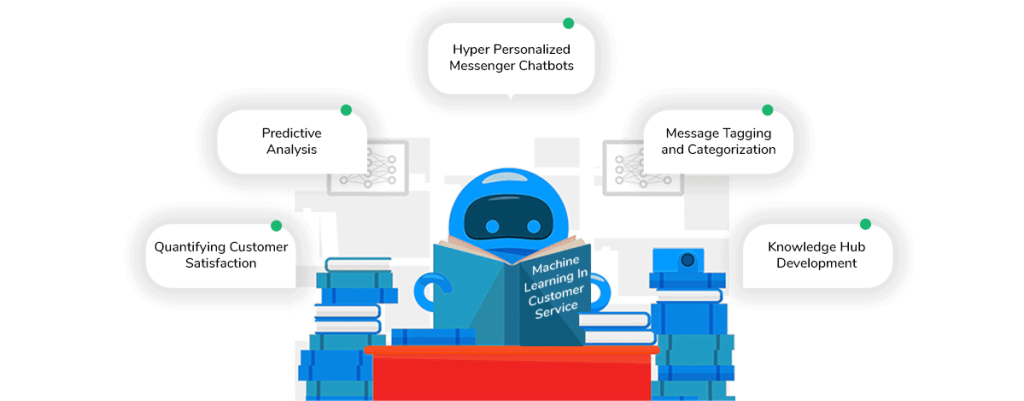
AI-enabled customer service refers to the integration of artificial intelligence (AI) technologies into customer support operations, revolutionizing the way businesses interact with their customers. By employing intelligent tools such as chatbots, virtual assistants, and natural language processing (NLP), companies can provide faster, more personalized, and efficient assistance.
The growing importance of AI in enhancing customer support arises from the increasing demand for seamless and immediate experiences. Customers today expect quick responses and personalized interactions, regardless of the time or communication channel they use to contact a company. Traditional support methods often struggle to meet these expectations due to resource limitations.
Through AI, businesses can significantly improve their support capabilities. AI-powered chatbots and virtual assistants can offer instant responses to common queries, resolve issues, and provide tailored recommendations based on customer preferences and past interactions. This reduces the burden on human agents and ensures 24/7 availability, ultimately leading to higher customer satisfaction.
AI’s data analysis and sentiment analysis capabilities also empower organizations to gain valuable insights into customer needs and concerns. By leveraging this information, businesses can proactively address emerging issues, identify trends, and customize their services to better meet customer expectations.
Furthermore, AI-enabled customer service proves cost-effective by streamlining operations and reducing the need for an extensive support team. By automating routine tasks and directing simple inquiries to AI systems, human agents can concentrate on resolving complex issues promptly, resulting in increased efficiency and customer retention rates.
The Role of AI in Customer Service

Artificial Intelligence (AI) plays a transformative role in customer service, revolutionizing how businesses interact with their customers and address their needs. Below are the key roles of AI in customer service:
- Automated Customer Support: AI-powered chatbots and virtual assistants are deployed on websites, social media, and messaging platforms to provide instant responses to customer inquiries. They handle routine queries, offer product information, and guide users through troubleshooting processes, resulting in quicker and more efficient support.
- 24/7 Availability: AI-enabled customer service is available round the clock, unlike human agents with limited working hours. This ensures customers can access support at any time, enhancing overall customer satisfaction.
- Personalized Customer Experiences: AI systems analyze vast amounts of customer data to understand preferences, purchase history, and behavior. This information enables businesses to deliver personalized recommendations, offers, and tailored solutions, creating a more individualized experience for each customer.
- Predictive Customer Service: AI predicts customer needs and potential issues based on historical data and behavior patterns. By proactively addressing problems before they arise, businesses can prevent customer dissatisfaction and improve loyalty.
- Efficient Call Routing: AI intelligently routes calls in call centers to the most appropriate human agent based on the customer’s query or profile. This reduces call waiting times and ensures customers are directed to the right person for a prompt resolution.
- Sentiment Analysis: AI analyzes customer feedback, social media posts, and reviews to gauge customer sentiment. This allows businesses to identify unhappy customers quickly and address their concerns before issues escalate.
- Language Support: AI-powered language translation capabilities enable businesses to provide support in multiple languages, making customer service more accessible to a global audience.
- Process Automation: AI streamlines various customer service processes, such as ticket management, order processing, and returns, reducing manual efforts and potential errors.
- Continuous Learning and Improvement: AI systems learn from interactions with customers, continuously improving their responses and accuracy over time. This adaptive learning process ensures that AI becomes more effective and reliable in delivering customer support.
- Handling Complex Queries: AI can handle complex queries that require access to extensive knowledge bases and databases. This frees up human agents to focus on more specialized and challenging tasks.
Overall, AI’s role in customer service is transformative, enabling businesses to provide more efficient, personalized, and proactive support to their customers. As AI technology continues to evolve, its impact on customer service is expected to grow, enhancing customer experiences and strengthening customer relationships.
Applications of AI in Customer Service:

The implementation of Artificial Intelligence (AI) in customer service is transforming the way businesses interact with their customers, offering a plethora of applications that enhance efficiency, personalization, and overall customer experience. Key applications of AI in customer service include:
- Chatbots and Virtual Assistants: AI-powered chatbots and virtual assistants deliver instant and automated responses to customer inquiries. They excel at handling routine queries, processing orders, and guiding customers through troubleshooting processes, resulting in quicker and more efficient support.
- Personalized Recommendations: By analyzing customer data, AI enables businesses to understand preferences, purchase history, and behavior. This facilitates the delivery of personalized product recommendations, offers, and content to each customer, increasing engagement and driving sales.
- Sentiment Analysis: AI can analyze customer feedback, social media posts, and reviews to gauge customer sentiment. By promptly identifying and addressing customer concerns, businesses can prevent potential issues from escalating and improve customer satisfaction.
- Voice Assistants: AI-powered voice assistants, like Amazon’s Alexa or Apple’s Siri, enable customers to interact with devices using natural language. They offer hands-free support and can assist with various tasks, from answering queries to setting reminders.
- Predictive Analytics: Leveraging historical customer data, AI predicts future behavior and needs. By understanding customer patterns, businesses can proactively address customer needs and anticipate potential issues.
- Automated Ticketing and Routing: AI automates ticketing systems, categorizes customer inquiries, and routes them to the most appropriate agent for faster resolution. This reduces response times and improves overall customer satisfaction.
- Customer Feedback Analysis: AI analyzes customer feedback and surveys to identify trends and insights. Businesses can make data-driven decisions, improve products, and enhance service quality using this valuable data.
- Language Translation: AI-powered language translation tools assist businesses in providing customer support in multiple languages, ensuring effective communication with a global customer base.
- Visual Search: AI enables visual search capabilities, empowering customers to find products by uploading images. This enhances the shopping experience and simplifies product discovery.
- Social Media Management: AI assists in managing social media interactions by monitoring mentions, responding to customer inquiries, and identifying potential brand crises.
- Self-Service Portals: AI-powered self-service portals enable customers to find information and troubleshoot issues independently, reducing the need for human intervention.
- Emotion Detection: AI can detect customer emotions during interactions, allowing businesses to tailor responses and support based on emotional cues.
These AI applications in customer service not only streamline support processes but also provide businesses with valuable insights to deliver exceptional customer experiences. Adopting AI technologies allows businesses to optimize their customer service strategies, increase efficiency, and build stronger customer relationships.
Benefits of AI-Enabled Customer Service

The adoption of AI in customer service brings forth numerous advantages, elevating the quality of support and enhancing customer experiences. The key benefits of AI-enabled customer service include:
- 24/7 Availability: AI-powered chatbots and virtual assistants offer round-the-clock support, ensuring customers can access assistance at any time, regardless of geographical location or working hours. This availability leads to increased customer satisfaction and loyalty.
- Instant Responses: AI chatbots provide immediate and automated responses to customer queries, reducing wait times and offering quick solutions. This real-time support enhances overall customer experience and engagement.
- Cost-Effectiveness: AI implementation in customer service can be more cost-effective compared to traditional support methods. Once deployed, AI systems can handle a large volume of inquiries without the need for additional human resources.
- Personalization: AI analyzes customer data to understand individual preferences and behaviors. This enables businesses to offer personalized recommendations, tailored product suggestions, and individualized support, leading to higher customer engagement and conversions.
- Efficiency and Scalability: AI systems can efficiently manage multiple customer interactions simultaneously, making them highly scalable to handle fluctuating support demands during peak periods or high-traffic events.
- Proactive Support: Utilizing predictive analytics, AI can anticipate customer needs and potential issues. Businesses can proactively address concerns before they arise, demonstrating a commitment to customer satisfaction and loyalty.
- Consistent Service Quality: AI ensures consistent support by adhering to predefined rules and responses. Customers receive uniform service regardless of the time or day they seek assistance.
- Reduced Response Times: AI automates ticketing and routing, directing customer inquiries to the most suitable agent or resolving common queries instantly. This reduces response times and improves issue resolution.
- Data-Driven Insights: AI-powered customer service generates valuable data and insights from customer interactions. These insights can inform businesses about customer preferences, pain points, and trends, facilitating data-driven decision-making.
- Multilingual Support: AI language translation capabilities enable businesses to provide support in multiple languages, catering to a diverse global customer base.
- Handling Complex Queries: AI is capable of handling complex queries by accessing vast knowledge bases and databases, ensuring customers receive accurate and comprehensive solutions.
- Improved Agent Efficiency: By automating routine tasks and inquiries, AI frees up human agents to focus on more complex and value-added tasks, increasing agent productivity and job satisfaction.
In conclusion, the integration of AI in customer service offers a multitude of benefits that empower businesses to deliver efficient, personalized, and proactive support to their customers. From enhancing customer satisfaction to optimizing operational efficiency, leveraging AI in customer service is a strategic move for businesses aiming to stay competitive and build lasting customer relationships.
Challenges and Considerations
Implementing AI-enabled customer service brings about several challenges and considerations that businesses must address to ensure its successful integration. These include:
- Data Quality and Privacy: The effectiveness of AI heavily relies on high-quality data. Ensuring data accuracy and integrity is crucial to prevent biased outcomes and inaccurate predictions. Moreover, businesses must prioritize customer data privacy and adhere to relevant data protection regulations.
- Algorithmic Bias: AI systems can inherit biases present in the data they are trained on, leading to discriminatory outcomes, particularly in customer interactions. Regular monitoring and testing are necessary to identify and mitigate algorithmic biases.
- Interpretability: Some AI models, especially complex ones like deep learning networks, can be challenging to interpret. Understanding how AI arrives at certain conclusions is essential for building customer trust and ensuring ethical decision-making.
- Customer Acceptance: Some customers may prefer human interactions over AI-powered systems. Striking the right balance between AI and human support is crucial to cater to different customer preferences.
- Complex Query Handling: While AI excels at handling routine queries, it may struggle with complex or novel questions. Businesses should be prepared to escalate such queries to human agents when necessary.
- Maintenance and Updates: AI models require continuous monitoring, maintenance, and updates to remain accurate and up-to-date. Timely updates and improvements are vital to avoid outdated information and responses.
- Integration with Existing Systems: Integrating AI-powered solutions with existing customer service systems and workflows can be challenging. Seamless integration is essential to ensure a cohesive customer support experience.
- Ethical Use of AI: Businesses must use AI responsibly and ethically, considering its impact on customers and society. Transparent communication about the use of AI and its limitations is essential for building customer trust.
- Security Concerns: AI-powered customer service systems can be vulnerable to security breaches and cyber-attacks. Robust security measures must be in place to protect customer data and prevent unauthorized access.
- Training and Skills Development: Successful AI implementation requires trained staff who can effectively monitor, manage, and interpret AI systems. Investing in training and skill development for employees is crucial to maximize the benefits of AI in customer service.
In conclusion, AI-enabled customer service offers significant potential for businesses, but addressing challenges related to data quality, bias, interpretability, customer acceptance, security, and ethical considerations is essential for successful and responsible implementation. By navigating these challenges effectively, businesses can harness the full potential of AI to deliver exceptional customer experiences.
Integrating AI with Human Support
The integration of AI with human support is a strategic approach that combines the strengths of both AI-powered automation and human expertise in customer service operations. This harmonious synergy allows businesses to deliver more efficient, personalized, and seamless customer experiences. Key aspects of integrating AI with human support include:
- Automating Routine Tasks: AI is proficient at handling repetitive customer queries, such as FAQs and order status inquiries. By automating these tasks, AI frees up human agents to focus on more complex and high-value interactions.
- Enhancing Response Speed: AI-powered chatbots and virtual assistants provide instant responses, significantly reducing response times. This immediate availability contributes to higher customer satisfaction and ensures timely resolution of customer issues.
- Personalization at Scale: AI can analyze vast amounts of customer data to understand preferences and behavior. This enables businesses to deliver personalized recommendations and tailored support to a large customer base.
- Seamless Escalation: When AI encounters complex queries or reaches its limitations, it seamlessly escalates the conversation to a human agent. This ensures customers receive expert assistance for more challenging issues.
- Continuous Learning: AI systems continuously learn from customer interactions, improving their responses and accuracy over time. This learning process enables AI to handle a broader range of queries effectively.
- Handling High Volume Traffic: During peak periods or promotional events, AI can efficiently handle a surge in customer inquiries. This scalability ensures consistent support without overwhelming human agents.
- Emotion Recognition: AI can be designed to recognize customer emotions during interactions. When detecting frustration or dissatisfaction, AI can route the conversation to a human agent who can provide empathy and understanding.
- Knowledge Retrieval: AI can access extensive knowledge bases and databases, providing instant access to relevant information. This helps human agents find accurate answers quickly and deliver informed support.
- Augmenting Human Expertise: AI tools serve as valuable resources for human agents, augmenting their expertise and providing real-time insights during customer interactions.
- Enhancing Training and Development: AI can aid in the training and onboarding of new customer service agents by providing simulations and practice scenarios.
- Adapting to Customer Preferences: Customers have different preferences for interacting with businesses. By offering both AI and human support options, businesses can cater to diverse customer preferences.
In conclusion, the integration of AI with human support is a strategic approach that maximizes the benefits of automation while retaining the human touch in customer service. By effectively leveraging AI tools alongside human expertise, businesses can create a customer support ecosystem that is efficient, personalized, and capable of delivering exceptional customer experiences.
Best Practices for Implementing AI in Customer Service

- Define Clear Objectives: Establish specific goals and objectives for incorporating AI in customer service. Identify areas where AI can add value, such as automating routine tasks, improving response times, or enhancing personalization.
- Start Small and Scale Up: Begin with a pilot project or limited deployment of AI in customer service. This approach allows for testing and fine-tuning the AI system before expanding it to larger operations.
- Data Quality and Security: Ensure the availability of high-quality and reliable data for training AI models. Implement robust data security measures to safeguard customer information and comply with data privacy regulations.
- Human-AI Collaboration: Facilitate seamless collaboration between AI and human support. Clearly define the roles of AI and human agents, allowing them to complement each other and deliver cohesive customer experiences.
- Transparency and Communication: Be transparent with customers about the use of AI in customer service. Clearly communicate when customers are interacting with AI-powered systems, and provide options for human assistance if needed.
- Regular Monitoring and Evaluation: Continuously monitor the performance of AI systems and gather feedback from customers and agents. Regularly assess AI effectiveness and make improvements as necessary.
- Customer Feedback Integration: Utilize customer feedback to enhance AI responses and identify areas where human support may be required. Actively listen to customer suggestions for improving the AI experience.
- Ethical AI Use: Implement AI applications with ethical considerations in mind. Avoid biases in AI algorithms and use AI responsibly, avoiding high-stakes decisions solely based on AI predictions.
- Agent Training and Support: Provide comprehensive training for human agents to work effectively with AI tools. Offer ongoing support and resources to help agents collaborate seamlessly with AI in customer interactions.
- Continuous Learning and Improvement: Integrate AI systems with continuous learning capabilities. AI should continuously improve its responses and adapt to changing customer needs and preferences.
- Accessibility and Inclusivity: Ensure that AI-powered customer service is accessible to all customers, including those with disabilities. Test AI interfaces for usability and inclusivity.
- Flexibility and Adaptability: Stay agile and be prepared to adjust the AI strategy as technology evolves and customer expectations change. Keep up with AI advancements to leverage new tools for better customer service.
By adhering to these best practices, businesses can successfully implement AI in customer service, creating a seamless, efficient, and customer-centric support experience. A thoughtful and well-executed AI integration can lead to higher customer satisfaction, increased efficiency, and improved overall customer loyalty.
Thanks,






Leave a Reply
You must be logged in to post a comment.